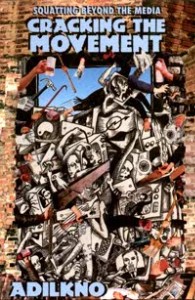ADILKNO
Translated by Laura Martz
Autonomedia
1994
239 pages
ADILKNO is a contraction, of sorts, that stands for the Society for the Advancement of Illegal Knowledge. That this ‘society’ involved three individuals including the currently active Dutch media theorist Geert Lovink, is about as much information as I can dredge up about the group. Autonomedia has published two books by the society, The Media Archive, a collection of short speculative essays on media that is largely incomprehensible. I don’t know if its incomprehensible because ADILKNO sought to exceed Jean Baudrillard in his use of obfuscating language and Marshall McLuhan in his willingness to speculate on media forms, or if its incomprehensible because the translation lacks clarity.
Cracking the Movement: Squatting Beyond the Media is the other ADILKNO book in the Autonomedia catalogue, and like Media Archive, it too suffers from incoherence at parts, likely due to its translation.
Cracking the Movement is an oral history of the squatters movement in Amsterdam during the 1980s. It describes, from a small number of different points of view, the major events of this movement at this time, albeit sometimes in an excruciatingly detailed fashion. Before summer 2010, when the Dutch government passed anti-squatting laws, taking an unoccupied building space for living purposes was legal provided certain conditions were present. During the 1980s, according to ADLINKO, there was a huge population of homeless in the Netherlands, and people (many of whom were punks and anarchists) started taking vacant housing for themselves.

From these squats, most notable among them the Groote Keyser, the squatters built up a communities of their own that included squat bars and systems of communication (newspapers and radio). The squats were both a launchpad for activist movements, and a prescient social issue in themselves. ADLINKO and their sources discuss how the squats were continually contested terrain under attack from police, landowners, fascist bullies, and rival squatters. They also discussed the conditions of Amsterdam during this period, such as a mix of poverty and gentrification that encroached upon the working class neighborhoods, and a city blanketed in garbage and dog waste. The activists from the squats fought against the city’s bid for the 1992 Olympic games, and fought against police after a squatter named Hans Kok died in a police station cell. The chapters often describe rapid shifts from relaxing and drinking beer to all-out direct action engagement with a social enemy.
The structure of Cracking the Movement is that of an oral history, in that much of the chapters are made up of transcribed verbal statements given by participants in the events of this squatting movement to the authors (who, by the way, were also participants). The book’s subtitle is “squatting beyond the media” implying that there was a chronically negative media portrayal of the squatters during the period, and this oral history was a means of asserting their own version of events. Presumably this is a situation that has not changed, as police and politicians continue to have a friendly relationship with an acritical and unquestioning newsmedia apparatus.
As I have already hinted at in an earlier paragraph, often these oral statements are incredibly detailed, and spare no minor element to a story. The level of detail presented by this text may be tedious to read, however it gives researchers a strong sense of context for this squatter movement, the people involved in it, and the events that directed its focus. It is occasionally a difficult text to read, possibly because of the translation from Dutch to English, as the language becomes nonsensical in parts, and incredibly convoluted in others. I suspect that this is due to the translators wish to preserve the rich detail that exists in the original Dutch text, but any reader of the English version should be mindful of translation issues before dismissing the book.
The full text of Cracking the Movement is available online from a number of sources including at textz.com.


No comments:
Post a Comment